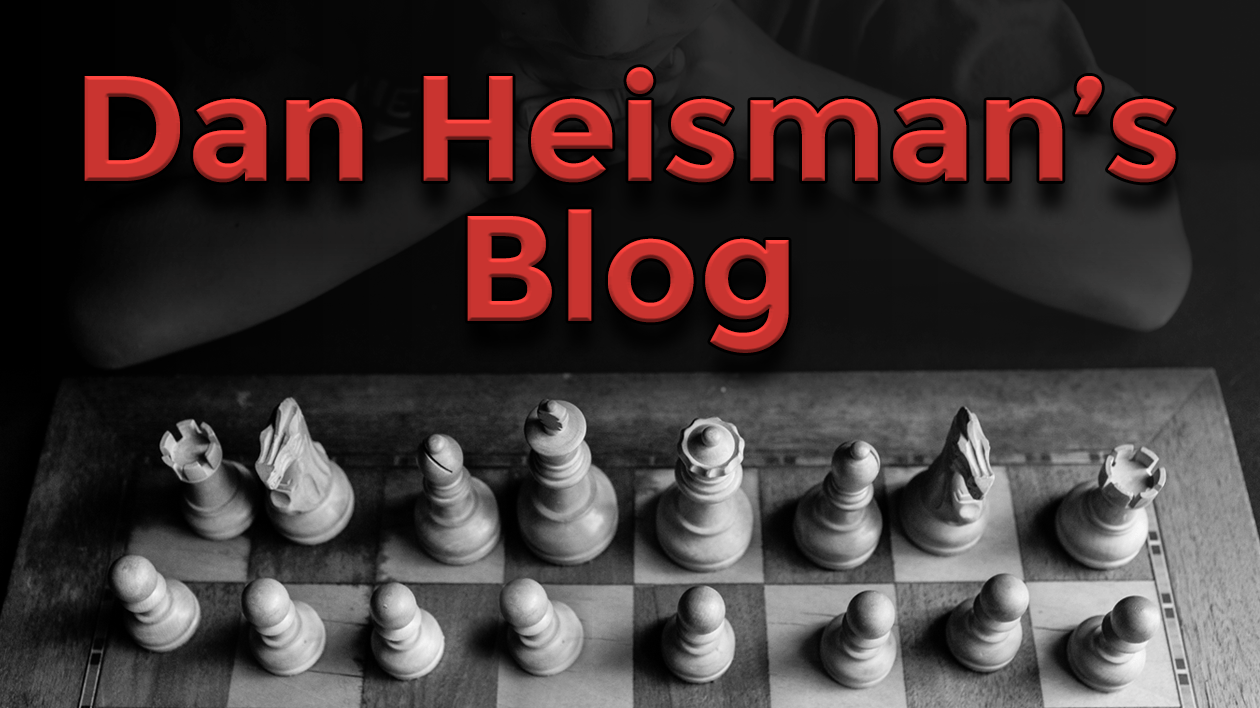
Losing on Time is Much Worse Than Making Bad Moves
Several years ago I played a series of 20 0 (20 minutes per game with no increment) games against an expert-level opponent. Being the better player, I often found myself in superior positions as time ran lower. For the sake of argument, let's say we often reached a point where my winning chances were 60-70% and we both had 2 minutes remaining.
But then something odd happened.
My opponent, contrary to most experts, refused to speed up to try to avoid losing on time. I, on the other hand, did speed up. What inevitably happened was that we would make several moves and I would still have over a minute left when my opponent lost on time. So I would duly claim the win, but then my opponent would make the unusual request
"Would you like to finish the game?"
Unusual because the game was over! Now during those past few moves my position would often deteriorate slightly as I avoided flagging (and my opponent continued to play slowly). Let's say my "final" position, if the game were not over, would now be completely even.
However, if we look at the "overall" evaluation (properly taking time into consideration), as my position slightly deteriorated my chances of winning (and your willingness to bet on me!) would soar from 60-70% to 100% once my opponent had so little time that he could not checkmate me before his flag fell.
While my expert opponent's attitude is extremely unusual for players rated 2000+, it is much more common among weaker players, especially those who grew up playing without a clock.
As a long-time professional chess instructor my job is to help my students get better results. Over the years, several of them admitted that they would rather let their flag fall, even in equal or superior (!) positions, than hastily make "bad" moves. While this is, in a weird way, somewhat admirable, it is also quite adverse to their goals of improvement, and often leads to stunting their growth as chess players.
Let's start with the rule book. Basically there are three main ways to lose a game: get checkmated, resign, or lose on time (when the opponent has mating material). All are scored equally: 0. It does not matter if you get Fool's mated in the opening or last 100 moves, it's scored (and rated) the same. Similarly, if you lose on time, it is scored the same whether you were winning or about to be checkmated.
But there's actually a big difference in how important it is not to lose on time when you're in a good position vs when your position is resignable anyway.
My wife does not really know how to play chess, but she can beat anyone who loses on time against her. What I am trying to say is that giving away a game is a lot different than trying your best and then having your opponent beat you.
If you are playing a good player and have a resignable position and lose on time in a vain attempt to find a move that might keep you in the game, you are not losing very much. From an expected value standpoint, you are going from a position where your expected number of points is close to zero to a situation (lost on time) with exactly zero.
But if you don't have a losing position, then you are losing much more. For example, if you have a king and 10 queens and your opponent has a king and a pawn (necessary mating material) and you zone out and flag, you are basically losing an entire point (should have scored 1; got 0 => losing 1 point more than expected). This is twice as bad as stalemating someone with a king and queen vs king (expected score 1; actual score 1/2 => losing 1/2 point).
Some players who suffer from losing on time claim "But I feel better if I have a good position and lose on time; if I make bad moves and lose I feel worse!" OK, let's assume that their perception does hold for them. However, they are suffering under a misconception that somehow it is "better" to have that good position and throw it 100% away in an instant by simply letting their clock fall than it is to suffer bad moves. They are basically making an excuse, one that won't just jeopardize their position (as bad moves do), but destroy their score. And on top of that, they learn much less when they let their clock fall; there's nothing to be learned there. However, there are a ton of things you can learn if you consistently try to win games from good positions or draw them from equal ones, even (or especially) when short of time. You won't always win, but you will try, learn, have some fun, and score at least some points.
The bottom line is that when you make moves you are human and will make mistakes. So will your opponent. If you play fast enough to not lose on time, sometimes you are going to throw away the win and get only a draw, and you may even lose. But if you lose on time, you will lose every time you do that, and even my wife could beat you (your opponent no longer makes mistakes when your flag falls...). The only way to maximize your score (and thus rating) would be to try your best and make sure you never lose on time in non-losing positions (this should be possible if you have a time delay or increment). Make your opponent beat you. Don't beat yourself.